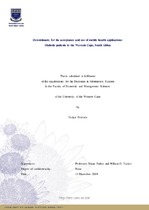| dc.contributor.advisor | Pather, Shaun | |
| dc.contributor.advisor | Tucker, William D. | |
| dc.contributor.author | Petersen, Fazlyn | |
| dc.date.accessioned | 2021-02-19T10:53:50Z | |
| dc.date.available | 2021-02-19T10:53:50Z | |
| dc.date.issued | 2019 | |
| dc.identifier.uri | http://hdl.handle.net/11394/7832 | |
| dc.description | Philosophiae Doctor - PhD | en_US |
| dc.description.abstract | The increased pervasiveness of information communication and technology and increasing internet access creates anticipation for how contemporary technologies can address critical developmental problems. Non-communicable diseases are the leading cause of death globally, even though more than 40% of the deaths are premature and avoidable. Diabetes is such a disease that causes 80% of non-communicable disease deaths in low and middle-income countries. Diabetes is also the leading cause of death in the Western Cape province of South Africa. Diabetes thus constitutes a challenge to achieve Sustainable Development Goal 3 that focuses on health and well-being for all people, at all ages. The potential of technology, such as the use of m-health applications, is recognised as a means to advance the Sustainable Development Goals through supporting health systems in all countries. | en_US |
| dc.language.iso | en | en_US |
| dc.publisher | University of Western Cape | en_US |
| dc.subject | Sustainable developmental goals | en_US |
| dc.subject | National development plan 2030 | en_US |
| dc.subject | Diabetes self-management | en_US |
| dc.subject | Technology acceptance and use | en_US |
| dc.subject | Information and communication technology for development | en_US |
| dc.title | Determinants for the acceptance and use of mobile health applications: Diabetic patients in the Western Cape, South Africa | en_US |
| dc.rights.holder | University of Western Cape | en_US |

